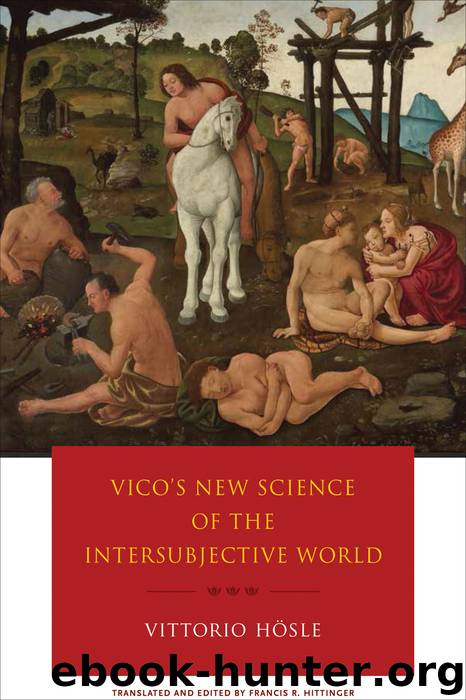Vico's New Science of the Intersubjective World by Hösle Vittorio; Hittinger Francis R.;

Author:Hösle, Vittorio; Hittinger, Francis R.;
Language: eng
Format: epub
Publisher: University of Notre Dame Press
Published: 2016-02-14T16:00:00+00:00
3.8 THE BARBARISM OF REFLECTION AND THE DECLINE OF CIVILIZATIONS
Nowhere does Vico so decisively depart from his time and from its optimistic faith in progress than he does in his thesis regarding the inherent tendency of cultures to decadence and decline. In fact, the phenomenon of the decline of cultures is so disturbing that, generally speaking, human beings easily come to be in a state of denial concerning it, even more than in the case of death—since the end of a single individual is much more innocuous, despite the terror that it causes. It was actually the age of enlightenment—with some exceptions such as Gibbon—that experienced this particularly intense denial. The intellectual independence of a personality like Vico’s was needed to develop a theory of decadence and decline of cultures that did not easily content itself with attributing their causes to merely exogenous factors, but which, rather, explained them on the basis of internal laws of development and even identified the presence of destructive forces that dissolve civilizations hidden within the essence of “reason” itself.
Whether or not Vico believed such decline was the inevitable fate of European culture seems destined to remain an open question, but there is no doubt that he considered it an effective possibility. The striking fear expressed by Vico’s eyes in Francesco Solimena’s portrait is not, as has been said, the fear of someone who has descended into the abysses of the archaic soul and has examined its taboos, sacrifices, and terrible rituals, but that of one who dreads that the same destiny that had befallen Rome awaits Christian Europe. We will examine Vico’s analysis of the modern age in section 3.12. Here we will discuss only the general structures relative to the decline and decadence of cultures.
Vico’s theory of decline is of course based on his analysis of the history of the Roman Empire.71 But Vico was also interested in the decline of other cultures, particularly of Greek culture. The internal disintegration of a civilization has different possible outcomes. Vico is less schematic here than usual and considers a great range of possibilities. But before analyzing these outcomes in detail, we must discuss the causes of decline. For Vico, these are clearly of a spiritual and intellectual nature: just as each of the different ages is based on a particular forma mentis, decline is based on a new forma mentis. Vico conceives of this forma mentis (or, to be more precise, its latest extreme) thanks to the fascinating concept of “barbarie della riflessione” (3SN §1106, IV, 2, p. 163; barbarism of reflection).72 Vico, of course, did not exhaust the wealth of meanings inherent in this concept; the elaboration of a complete phenomenology of this barbarism is left for even more decadent epochs, and the material to review has in any case increased considerably since Vico’s time. But Vico’s certain merit lies in having grasped the basic structures of this forma mentis.
It is characterized by a formal use of the intellect, whose substantial foundation has been
Download
This site does not store any files on its server. We only index and link to content provided by other sites. Please contact the content providers to delete copyright contents if any and email us, we'll remove relevant links or contents immediately.
The remains of the day by Kazuo Ishiguro(8395)
Tools of Titans by Timothy Ferriss(7815)
Giovanni's Room by James Baldwin(6810)
The Black Swan by Nassim Nicholas Taleb(6770)
Inner Engineering: A Yogi's Guide to Joy by Sadhguru(6441)
The Way of Zen by Alan W. Watts(6289)
Asking the Right Questions: A Guide to Critical Thinking by M. Neil Browne & Stuart M. Keeley(5357)
The Power of Now: A Guide to Spiritual Enlightenment by Eckhart Tolle(5333)
The Six Wives Of Henry VIII (WOMEN IN HISTORY) by Fraser Antonia(5238)
Astrophysics for People in a Hurry by Neil DeGrasse Tyson(5002)
12 Rules for Life by Jordan B. Peterson(4161)
Housekeeping by Marilynne Robinson(4064)
The Ethical Slut by Janet W. Hardy(4040)
Skin in the Game by Nassim Nicholas Taleb(3968)
Double Down (Diary of a Wimpy Kid Book 11) by Jeff Kinney(3927)
Ikigai by Héctor García & Francesc Miralles(3895)
The Art of Happiness by The Dalai Lama(3847)
Skin in the Game: Hidden Asymmetries in Daily Life by Nassim Nicholas Taleb(3724)
Walking by Henry David Thoreau(3681)
